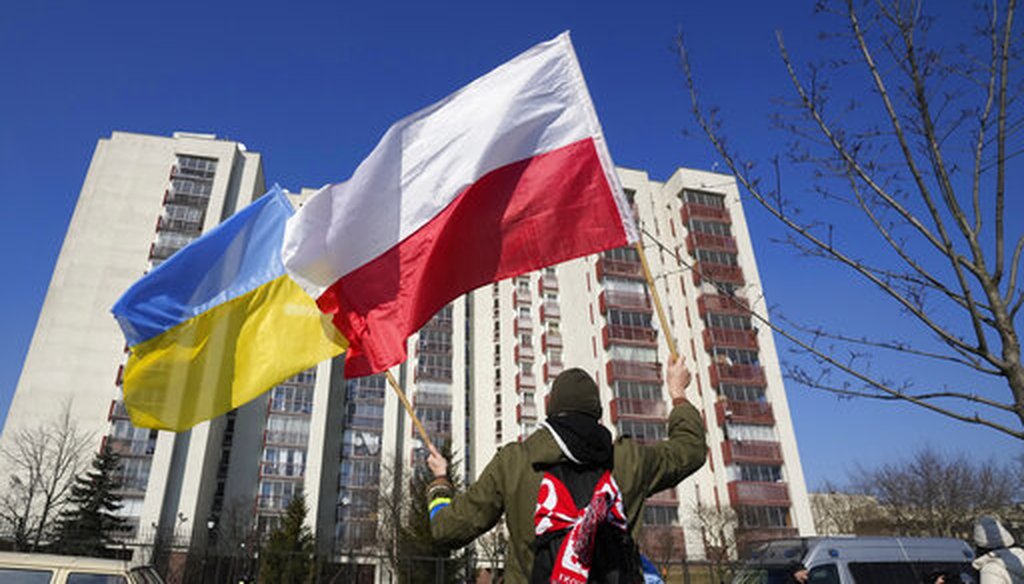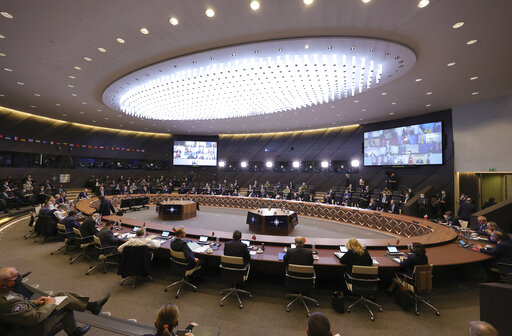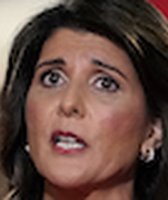Stand up for the facts!
Our only agenda is to publish the truth so you can be an informed participant in democracy.
We need your help.
I would like to contribute

A man waves the Ukrainian and Polish flag during a demonstration in front of a building housing Russian diplomats in Warsaw, Poland, on March 13, 2022. (AP)
If Your Time is short
• The North Atlantic Treaty Organization, or NATO, is the decades-old, U.S.-led alliance that is a military counterweight to Russia. NATO members are expected to defend any other member that is attacked by a non-member, such as Russia.
• Because Ukraine is not a NATO member, the U.S.-led alliance has no formal obligation to intervene against Russia’s invasion. However, if Russia attacks a NATO-member nation, it could prompt NATO to invoke what’s known as Article 5, a collective-defense mechanism.
• The possibility of a Russian strike on a NATO member is closer than ever: On March 13, Russia attacked Yavoriv, a military training site in western Ukraine just a dozen miles from the Polish border.
• A Russian attack on a NATO country would not inevitably lead to a shooting war between NATO and Russia. That’s because NATO’s deliberation process for invoking Article 5 allows the alliance to set aside small or accidental strikes. And even if NATO does invoke Article 5, each NATO member would decide what, if any, role it takes in the response.
So far, the military conflict following Russia’s invasion of Ukraine has remained within the borders of Ukraine. But it may not stay there — and if not, there’s a chance of a military faceoff between Russia and the U.S.-led North Atlantic Treaty Organization, or NATO.
Ukraine is bordered by four NATO members: Hungary, Poland, Romania and Slovakia. (A fifth neighboring country, Moldova, is not a NATO member.) Further north, Russia borders the three Baltic states, each of which belongs to NATO: Estonia, Latvia and Lithuania.
Because Ukraine is not a NATO member, the alliance has no formal obligation to intervene to stop Russia’s invasion. However, if Russia attacks any of the NATO-member nations, it could prompt NATO to invoke what’s known as Article 5, a collective-defense mechanism that NATO itself describes as "the very heart of NATO’s founding treaty."
Rhetorically, top U.S. officials have reiterated their support for the obligation to defend fellow NATO members who have been attacked militarily. In his State of the Union address, President Joe Biden pledged to "defend every inch of territory of NATO countries with the full force of our collective power."
And Secretary of State Antony Blinken said March 7 in Vilnius, Lithuania, that "if there is any aggression anywhere, on NATO territory on NATO countries, we the United States, all of our allies and partners will take action to defend every inch of NATO territory. It's as clear and direct as that."
An invocation of Article 5 is no longer an abstract question. On March 13, Russia attacked Yavoriv, a military training site in western Ukraine, just a dozen miles from the Polish border.
Could NATO’s Article 5 require the United States, as the key member of NATO’s military, to wage a direct military fight against Russia? Experts say it could, but they add that there is a considerable gray area that confounds easy assumptions. Article 5 does not lead inexorably to full-scale war; it offers a framework for developing a measured response, with each country deciding what action to take.
NATO currently consists of 30 nations.
The first 16 countries joined between 1949 and 1982. In order of population, they are the United States, Turkey, Germany, the United Kingdom, France, Italy, Spain, Canada, the Netherlands, Belgium, Greece, Portugal, Denmark, Norway, Luxembourg, and Iceland.
The next 14 countries joined beginning in 1999, after the Soviet Union crumbled. They are Albania, Bulgaria, Croatia, the Czech Republic, Estonia, Hungary, Latvia, Lithuania, Montenegro, North Macedonia, Poland, Romania, Slovakia, and Slovenia.
The key text of Article 5 says that "an armed attack against one or more" NATO members "shall be considered an attack against them all," and that in this scenario, the members agree to "assist the party or parties so attacked" with "such action as it deems necessary, including the use of armed force."
If a triggering event occurs, NATO members "meet to discuss whether they agree that actions on the ground rise to the level of invoking Article 5," said Mai’a K. Davis Cross, a professor of political science and international affairs at Northeastern University. "They must reach consensus on this, rather than taking a formal vote. Consensus can mean that no government objects to invoking Article 5."
Groups of NATO members acting individually have sometimes taken steps to advance security goals, but Article 5 itself has only been invoked once — in the wake of the 9/11 terrorist attacks in 2001.
In October 2001, NATO agreed to a package of measures to support the United States, including the deployment of seven NATO aircraft and 830 crew members from 13 countries to patrol U.S. airspace. A second mission after 9/11 involved naval patrols and surveillance in the Mediterranean Sea.
NATO Secretary General Jens Stoltenberg, center left, convenes NATO leaders, both in person and on screen, for a virtual summit at NATO headquarters in Brussels on Feb. 25, 2022. (AP)
Nothing is inevitable, experts say.
"There is as much or as little wiggle room as NATO states want to recognize," said Brendan R. Green, a University of Cincinnati political scientist.
Specifically, two potential off-ramps exist before NATO directly faces off against Russia’s military.
First, NATO members may not come to consensus on a direct military response to a Russian attack. "There is no automatic response of any kind, under any circumstances," said Michael O’Hanlon, a senior fellow at the Brookings Institution.
In recent years, NATO members have acknowledged being hit by Russian cyber attacks, but "so far, this is not considered the same as an armed attack that could invoke Article 5," Cross said.
Even a conventional military attack by Russia might not be deemed to be of sufficient intensity or duration to trigger Article 5, or else the attack could be determined to be accidental.
"If the attack is accidental, such as a stray missile landing over the border in Poland, NATO members would have to meet and decide if it was indeed a mistake," Cross said. "No one wants to escalate into a broader war just because of human error, so deliberation within NATO is important."
In one instance in the 1970s, NATO avoided invoking Article 5 when two of its members — Greece and Turkey — waged war against each other over control of Cyprus.
Second, even if NATO members do reach consensus and invoke Article 5, every member can decide what it would like to contribute, militarily or otherwise.
The declaration of Article 5 "is really a kind of permission slip for the alliance to decide how to act, collectively and as individual members," said Charles Kupchan, a senior fellow at the Council on Foreign Relations and a professor at Georgetown University.
Even after 9/11, "not all NATO members went to war in Afghanistan, and not all that did participated equally," said Simon Miles, an assistant professor at Duke University’s Sanford School of Public Policy.
Indeed, Article 5 is designed to provide the NATO membership with a variety of possible responses, rather than an inflexible mandate.
"If NATO invokes Article 5, does that mean World War III starts the next day? No," Kupchan said. "NATO’s response would likely be mindful of the risk of further escalation. In fact, the response could be economic rather than military."
While the Biden administration has reiterated its pledge to defend a NATO member attacked by Russia, Pentagon spokesman John Kirby has been careful to note that the decision is up to NATO members collectively, not to the United States alone.
Invoking Article 5 is "a question for the alliance to make," Kirby told CNN. "Specifically, I would just remind that Article 5 makes it clear that it's an armed attack on a NATO ally (that) triggers Article 5. ... But how that's interpreted — that would be really something for the NATO alliance to determine."
Given how the invasion of Ukraine has developed, "there is a distinct danger of accidental escalation that quickly grows into something that triggers Article 5," Cross said. "If a missile from Russia erroneously lands in the territory of a NATO member state, the military on the ground may respond in the moment, and this could grow into a real exchange of artillery across the border itself."
So, she said, regardless of whether the first shot was accidental, the fighting "could quickly become purposeful, and then we would have direct confrontation between a NATO member state and Russia."
Still, several experts we interviewed cautioned against jumping to a worst-case scenario. For one thing, the longer Russia is bogged down fighting to control Ukraine, the more it hampers the feasibility of Russia widening the war by attacking a NATO-member country.
In addition, NATO’s deliberation process allows time to scrutinize whether a given Russian attack merits an Article 5 response.
"The only circumstances where I could see this happening would be after military attacks on NATO territory," Green said. "Even then, I suspect NATO members might want to wait until it was clear that attacks were part of a sustained and deliberate campaign, rather than the result of something like ‘hot pursuit’ or other semi-inadvertent processes."
Our Sources
NATO, member countries, accessed March 14, 2022
NATO, "Collective defense - Article 5," accessed March 14, 2022
NATO, "The North Atlantic Treaty, Washington, D.C.," April 4, 1949
New York Times, "Booms, Smoke and Fire Signal Horror of Russian Attack on Base," March 13, 2022
CNN, "Here's what NATO's Article 5 is and how it applies to Russia's invasion of Ukraine," March 7, 2022
CNN, "President Biden's State of the Union address," March 2, 2022
CNN, "March 7, 2022 Russia-Ukraine news," March 8, 2022
Brianna Keilar, tweet, March 4, 2022
Email interview with Brendan R. Green, University of Cincinnati political scientist, March 14, 2022
Email interview with Michael O’Hanlon, senior fellow at the Brookings Institution, March 14, 2022
Email interview with Simon Miles, assistant professor at Duke University’s Sanford School of Public Policy, March 14, 2022
Email interview with Mai’a K. Davis Cross, professor of political science and international affairs at Northeastern University, March 14, 2022
Interview with Charles Kupchan, senior fellow at the Council on Foreign Relations and a professor of international affairs at Georgetown University, March 14, 2022













































